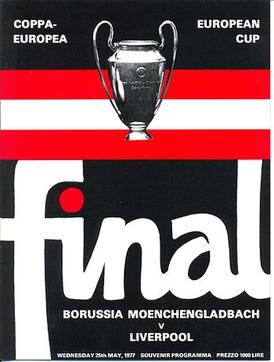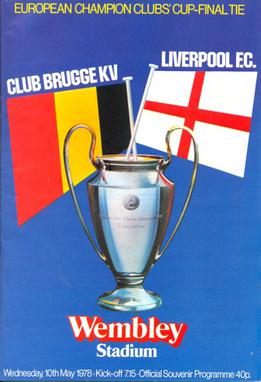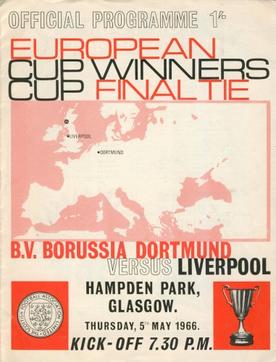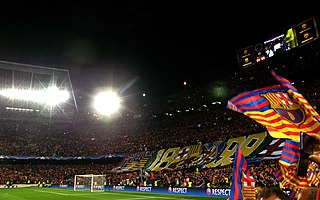The away goals rule is a method of tiebreaking in association football and other sports when teams play each other twice, once at each team's home ground. Under the away goals rule, if the total goals scored by each team are equal, the team that has scored more goals "away from home" wins. This is sometimes expressed by saying that away goals "count double" in the event of a tie, though in practice the team with more away goals is simply recorded as the victor, rather than having additional or 'double' goals added to their total.

This page details statistics of the European Cup and Champions League. Unless notified these statistics concern all seasons since inception of the European Cup in the 1955–56 season, and renamed since 1992 as the UEFA Champions League. Does not include the qualifying rounds of the UEFA Champions League, unless otherwise noted.
The history of the European Cup and UEFA Champions League spans over sixty years of competition, finding winners and runners-up from all over the continent.

The 2001 Football League Cup Final was a football match played between Birmingham City and Liverpool on 25 February 2001 at the Millennium Stadium, Cardiff. It was the final match of the 2000–01 Football League Cup, the 41st season of the Football League Cup, a football competition for the 92 teams in the Premier League and the English Football League. Liverpool were appearing in their eighth final; they had previously won six and lost two, while Birmingham were there for the second time. During their last appearance, they had previously beaten local rivals Aston Villa in the 1963 final.

The 1985 European Cup Final was an association football match between Liverpool of England and Juventus of Italy on 29 May 1985 at the Heysel Stadium, Brussels, Belgium. It was the final match of the 1984–85 season of the European Cup, Europe's premier cup competition. Liverpool were the reigning champions and were appearing in their fifth final, having won the competition in 1977, 1978, 1981 and 1984. Juventus were appearing in their third European Cup final; they lost both of their previous appearances in 1973 and 1983.

The 1977 European Cup Final was an association football match between Liverpool of England and Borussia Mönchengladbach of West Germany on 25 May 1977 at the Stadio Olimpico in Rome, Italy. The showpiece event was the final match of the 1976–77 season of Europe's premier cup competition, the European Cup. Both teams were appearing in their first European Cup final, although the two sides had previously met in the 1973 UEFA Cup Final, which Liverpool won 3–2 on aggregate over two legs.

The 1978 European Cup Final was an association football match between Liverpool of England and Club Brugge of Belgium on 10 May 1978 at Wembley Stadium, London, England. It was the final match of the 1977–78 season of Europe's premier cup competition, the European Cup. Liverpool were the reigning champions and were appearing in their second European Cup final. Club Brugge were appearing in their first European Cup final. The two sides had met once before in European competition, when they contested the 1976 UEFA Cup Final, which Liverpool won 4–3 on aggregate.

Liverpool Football Club is a professional association football club in Union of European Football Associations (UEFA) competitions. Since 1964, they have won fourteen European and Worldwide trophies, more than any other British club. These consist of the UEFA Champions League six times, the UEFA Europa League three times, the UEFA Super Cup four times, and the FIFA Club World Cup once.

The 2001 UEFA Cup Final was a football match between Liverpool of England and Alavés of Spain on 16 May 2001 at the Westfalenstadion in Dortmund, Germany. The showpiece event was the final match of the 2000–01 edition of Europe's secondary cup competition, the UEFA Cup. Liverpool were appearing in their third UEFA Cup final, after their appearances in 1973 and 1976. It was the first European final they had reached since being banned from European competition following the Heysel Stadium disaster in 1985. Alavés were appearing in their first European final.

The 1981 European Cup Final was an association football match between Liverpool of England and Real Madrid of Spain on 27 May 1981 at the Parc des Princes, Paris, France. It was the final match of the 1980–81 season of Europe's premier cup competition, the European Cup. Liverpool were appearing in their third final, after two appearances in 1977 and 1978. Real Madrid were appearing in their ninth final, they had previously won the competition six times and lost twice.

The 1966 European Cup Winners' Cup Final was an association football match between Borussia Dortmund of West Germany and Liverpool of England played on 5 May 1966 at Hampden Park, Glasgow, Scotland. It was the final match of the 1965–66 season of Europe's secondary cup competition, the European Cup Winners' Cup. Both sides were competing in their first European final.
The 1976 UEFA Cup Final were association football matches played over two-legs between Liverpool of England and Club Brugge of Belgium on 28 April 1976 at Anfield, Liverpool and on 19 May 1976 at the Olympiastadion, Bruges. It was the final of the 1975–76 season of Europe's secondary cup competition, the UEFA Cup. Liverpool were appearing in their second final; they had won the competition in 1973. Brugge were appearing in their first European final and were the first Belgian team to reach the final of a European competition.
The 1973 UEFA Cup Final was an association football match played over two-legs between Liverpool of England and Borussia Mönchengladbach of West Germany. The first leg was played at Anfield, Liverpool on 10 May 1973 and the second leg was played on 23 May 1973 at the Bökelbergstadion, Mönchengladbach. It was the final of the 1972–73 season of Europe's secondary cup competition, the UEFA Cup. Liverpool and Mönchengladbach were both appearing in their first final, although Liverpool had previously reached the final of the European Cup Winners' Cup losing 2–1 to Borussia Dortmund.

The 1984 European Super Cup was an association football match between Italian team Juventus and English team Liverpool, which took place on 16 January 1985 at the Stadio Comunale. The match was the annual European Super Cup contested between the winners of the European Cup and European Cup Winners' Cup. At the time, the European Super Cup was generally a two-legged fixture, but was held in Turin after draw by initiative by both clubs' executives due to fixture congestion, being the first edition in which the competition was disputed in a single match.

The 1981 Intercontinental Cup was an association football match between Liverpool of England and Flamengo of Brazil on 13 December 1981 at the National Stadium in Tokyo, Japan. The annual Intercontinental Cup was contested between the winners of the European Cup and Copa Libertadores. Flamengo qualified for the Intercontinental Cup for the first time following their Copa Libertadores Cup success. Liverpool were also appearing in their first Intercontinental Cup. They had declined to take part in 1977 and 1978 after they won the European Cup. On 27 October 2017, following a meeting held in Kolkata, India, the FIFA Council recognised the winners of Intercontinental Cup as world champions.
The knockout phase of the 2008–09 UEFA Champions League began on 24 February 2009 and concluded with the final at the Stadio Olimpico in Rome on 27 May 2009. The knockout phase involved the 16 teams who finished in the top two in each of their groups in the group stage.

The history of Liverpool Football Club from 1959 to 1985 covers the period from the appointment of Bill Shankly as manager of the then-Second Division club, to the Heysel Stadium disaster and its aftermath.

The history of Liverpool Football Club from 1985 to the present day covers the appointment of Kenny Dalglish as manager, the Hillsborough disaster, and the club's return to European competition in 1991. Throughout this period, the club played in the top tier of English football, which in 1992 became the Premier League.

Ajax 5–1 Liverpool was a football match between Ajax and Liverpool on 7 December 1966 at the Olympic Stadium in Amsterdam, Netherlands. It was the first leg of a second round tie in the 1966–67 European Cup. The match was given the Dutch title "De Mistwedstrijd" as it was played in dense fog.

FC Barcelona 6–1 Paris Saint-Germain F.C. was the result of the second leg of a UEFA Champions League tie which occurred on 8 March 2017 at the Camp Nou in Barcelona. FC Barcelona overcame a four-goal deficit in the second leg of their 2016–17 UEFA Champions League round of 16 tie against Paris Saint-Germain to win 6–5 on aggregate, making it the largest comeback in UEFA Champions League history in a controversial match, which became known in Spain and France as la Remontada.















